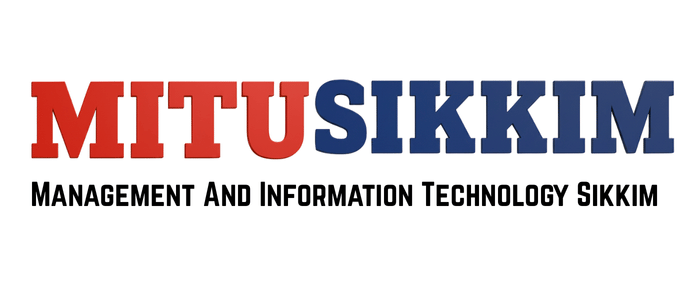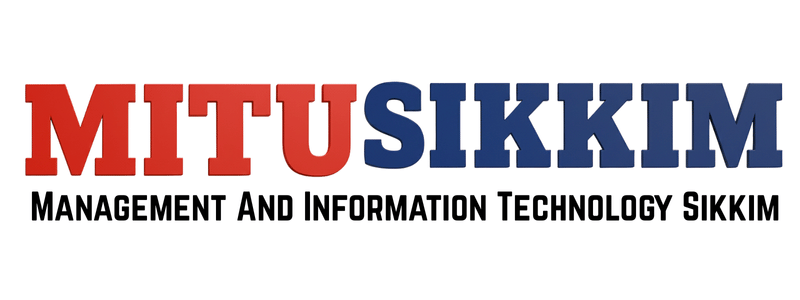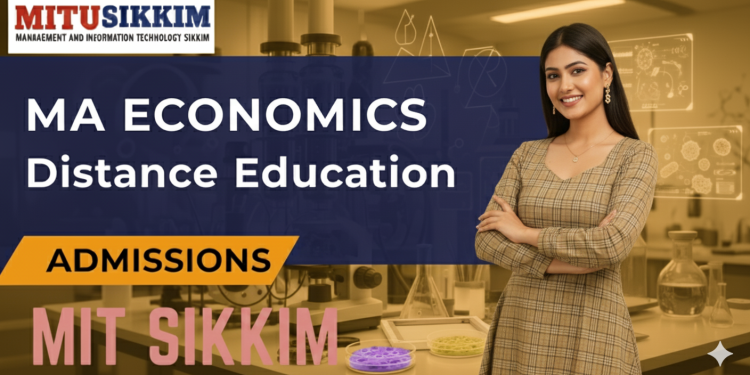MA Economics Distance Education Admission 2025 is open for prospective students seeking advanced study in economics. The Master of Arts in Economics program helps students understand economic theory, policy analysis, and research methods through flexible learning. This 2-year postgraduate program covers microeconomics, macroeconomics, and development economics with a comprehensive curriculum. Students need a bachelor’s degree with minimum 45% marks for eligibility. The admission process is merit-based with no entrance exam requirement. Application fee ranges from INR 500 to INR 1,500 depending on the university. Course fees typically cost between INR 15,000 to INR 35,000 per year. The program offers specializations in areas like econometrics, public economics, and international trade. Important to note: MIT University Sikkim provides quality vocational and training-based education programs rather than distance education courses, focusing on practical skills and industry-oriented learning for students.
MA Economics Distance Education Admission Process 2025-26
The admission process for MA Economics Distance Education requires careful planning and proper documentation. Here’s what students need to know:
- Eligibility Requirements: Candidates must hold a bachelor’s degree in economics or related field with minimum 45% aggregate marks from recognized university for admission consideration.
- Age Limits: Most universities do not impose age restrictions for distance education programs, making it accessible for working professionals and mature students.
- Entrance Examinations: Generally no entrance exams required for MA Economics distance admission as selection is primarily based on merit from qualifying degree examination.
- Application Fees: Registration fees range from INR 500 to INR 2,000 depending on university, payable online through various digital payment methods.
- MIT Sikkim Background: MIT University Sikkim offers comprehensive vocational training programs with industry-focused curriculum and practical learning approach for student development.
- Career Counseling: Free career guidance services available both online and offline to help students choose appropriate specialization and understand career prospects.
- Application Deadlines: Last dates vary by university, typically ranging from October 15, 2025 to November 25, 2025 for academic session commencement.
- Counseling Process: Merit-based counseling conducted after document verification where students can select their preferred study center and specialization subjects.
MA Economics Distance Admission Overview
Understanding the MA Economics distance education program helps students make informed decisions about their academic journey and career goals.
- About Course: MA Economics distance education provides comprehensive study of economic principles, statistical methods, and policy analysis through flexible learning modes.
- MIT Sikkim Benefits: MIT University Sikkim admission offers industry-oriented vocational programs with practical training, placement assistance, and quality education standards for students.
- Program Duration: The course spans 2 years divided into 4 semesters with minimum duration of 2 years and maximum completion time of 5 years.
- Eligibility Criteria: Candidates need bachelor’s degree in economics or relevant field with 45% minimum marks, though some universities accept 40% for reserved categories.
- Curriculum Overview: Study areas include microeconomic theory, macroeconomic analysis, econometrics, development economics, international trade, and research methodology for comprehensive understanding.
- Learning Flexibility: Distance education allows students to study at their own pace with online resources, recorded lectures, and flexible examination schedules.
- Career Opportunities: Graduates can pursue roles as economists, financial analysts, policy researchers, data analysts, and banking professionals in various sectors.
- Alternative Institutions: Students can also consider IGNOU, DU SOL, and other UGC-approved universities offering MA Economics through distance mode.
What is MA Economics Distance Education?
MA Economics Distance Education is a postgraduate program that allows students to study economics without attending regular classes. The course covers economic theories, statistical analysis, and policy research through online learning platforms and study materials. Students learn about market behavior, government policies, international trade, and economic development. The program includes subjects like microeconomics, macroeconomics, econometrics, and research methods. Distance learning provides flexibility for working professionals and students who cannot attend regular college. Study materials include textbooks, online lectures, and digital resources for comprehensive learning.
The curriculum focuses on analytical skills and economic reasoning. Students develop understanding of economic problems and solutions. The program prepares graduates for careers in banking, research, government, and private sector. Assessment includes assignments, projects, and semester examinations. Distance education makes quality economics education accessible to students across different locations and backgrounds.
Why Choose MIT Sikkim Vocational Programs?
While MIT University Sikkim does not offer distance education, it provides excellent vocational and training-based programs that deliver practical skills and industry readiness.
- Industry-Oriented Curriculum: MIT Sikkim focuses on practical skills development through hands-on training and real-world project experience for better job readiness.
- Quality Education Standards: The university maintains high academic standards with experienced faculty and modern infrastructure to ensure comprehensive learning for students.
- Career Development Support: Placement assistance, career counseling, and skill development programs help students transition successfully from education to professional careers.
- Practical Training Approach: Emphasis on vocational training ensures students gain practical experience alongside theoretical knowledge for industry requirements and job market demands.
- Distance Education Alternative: For students seeking flexible MA Economics study, universities like IGNOU and DU SOL offer quality distance programs with affordable fees.
MA Economics Distance Admission Eligibility Criteria
Understanding eligibility requirements helps students determine their qualification status and plan their admission process accordingly for successful enrollment.
- Educational Qualification: Candidates must possess bachelor’s degree in economics or related disciplines like mathematics, statistics, commerce from UGC-recognized university with valid certificates.
- Minimum Marks Requirement: Generally 45% aggregate marks required in graduation, though some universities accept 40% for SC/ST candidates and 42% for OBC category students.
- Merit-Based Selection: Admission decisions primarily based on graduation marks and academic performance rather than entrance examinations, making process straightforward for qualified candidates.
- Free Counseling Available: MIT University Sikkim provides free counseling services to help students understand various vocational program options and make informed educational decisions.
- Document Verification: Original certificates, mark sheets, and identity proofs must be submitted during admission process for verification and enrollment completion procedures.
- No Age Restrictions: Most universities welcome students of all ages, allowing working professionals and mature learners to pursue higher education goals.
MA Economics Distance Learning Fee
Fee structure varies across universities, and students should compare costs to find affordable options that suit their budget requirements.
- Total Program Fee: Complete course cost ranges from INR 30,000 to INR 70,000 for 2-year program depending on university reputation and facilities provided.
- Application Fee: Registration charges typically INR 500 to INR 2,000 for application processing and document verification during admission procedure.
- Prospectus Fee: Study material and prospectus cost approximately INR 200 to INR 500 for comprehensive course information and guidance materials.
- Assessment Fee: Examination and assessment charges around INR 1,000 to INR 3,000 per semester for evaluation and certification processes completion.
- Additional Costs: Extra expenses include books, project work, and practical sessions ranging from INR 5,000 to INR 10,000 throughout the course duration.
- Payment Flexibility: Most universities offer installment payment options and semester-wise fee structure for student convenience and financial planning assistance.
Benefits of Choosing Vocational Education at MIT Sikkim
MIT University Sikkim’s vocational approach provides distinct advantages for students seeking practical skills and industry-relevant education for career success.
- Hands-On Learning Experience: Vocational programs emphasize practical training and skill development through workshops, labs, and real-world projects for enhanced learning outcomes.
- Industry Partnership: Strong connections with various industries provide internship opportunities, guest lectures, and placement support for students’ professional growth and development.
- Career-Ready Skills: Focus on developing job-relevant skills and competencies that match current market demands and employer expectations for immediate employability.
- Flexible Learning Options: While not distance education, MIT Sikkim offers flexible scheduling and practical training programs suitable for working professionals and students.
- Quality Faculty Support: Experienced instructors provide personalized guidance and mentorship throughout the learning journey for academic and career success achievement.
How to Apply for MIT University Vocational Programs?
Students interested in MIT University Sikkim’s vocational programs can follow these steps for admission process and enrollment completion.
- Visit Official Website: Access https://mituniversitysikkim.com/ to explore available vocational programs, admission requirements, and application procedures for enrollment process.
- Program Selection: Review various vocational courses offered and choose programs that align with career goals and educational background for optimal learning experience.
- Application Form: Complete online application form with accurate personal, educational, and contact details for admission processing and communication purposes efficiently.
- Document Submission: Upload required certificates, mark sheets, photographs, and identity proofs as specified in application requirements for verification and processing.
- Fee Payment: Pay application and registration fees through online payment gateway using debit card, credit card, or net banking for secure transactions.
- Counseling Session: Attend free counseling sessions to discuss program details, career prospects, and clarify doubts about courses and admission procedures.
- Confirmation Process: Complete enrollment formalities after selection and receive confirmation letter with further instructions for course commencement and orientation program.
- Orientation Attendance: Participate in orientation program to understand course structure, faculty introduction, and institutional policies for smooth academic journey.
Documents Required
Essential documents needed for MA Economics distance education admission ensure smooth application processing and verification procedures completion.
- Graduation Certificate: Original degree certificate or provisional certificate from recognized university as proof of educational qualification for admission eligibility verification.
- Mark Sheets: All semester mark sheets or consolidated marksheet showing minimum required percentage for program admission and merit calculation purposes.
- Identity Proof: Valid government-issued photo identification like Aadhaar card, passport, or driving license for student identity verification and record maintenance.
- Residence Proof: Address proof documents such as utility bills or bank statements for correspondence and communication purposes during course duration.
- Category Certificate: SC/ST/OBC certificate if applicable for fee concession and reservation benefits as per government regulations and university policies.
- Passport Photos: Recent passport-size photographs for identity cards, examination forms, and official university records and documentation requirements.
- Migration Certificate: Transfer certificate from previous university if changing institution for continuation of higher education and academic record maintenance.
MA Economics Career Prospects Distance Learning
MA Economics graduates have diverse career opportunities across government, private sector, and research institutions with competitive salary packages and growth prospects.
- Economist Positions: Work in research institutions, policy organizations, and government departments analyzing economic trends and providing policy recommendations with average salary INR 5.5 LPA.
- Financial Analyst: Analyze market trends, investment opportunities, and financial data for banks, investment firms, and corporate organizations earning approximately INR 6 LPA annually.
- Market Research Specialist: Conduct market analysis, consumer behavior studies, and business research for companies requiring economic insights with starting salary INR 5.10 LPA.
- Banking Sector: Join banks as credit analysts, loan officers, or risk management professionals with opportunities in both public and private banking institutions.
- Government Jobs: Apply for positions in RBI, Planning Commission, Finance Ministry, and other government organizations through competitive examinations like RBI Grade B.
- Teaching Career: Pursue teaching positions in colleges and universities after clearing NET/SET examinations for academic career in economics education field.
- Research Opportunities: Work as research associates in think tanks, consulting firms, and academic institutions conducting economic research and policy analysis studies.
MA Economics Structure and Curriculum
The comprehensive curriculum covers essential economics topics across four semesters with theoretical knowledge and practical applications for holistic learning experience.
Year 1
| Subject Code | Subject Name | Credits |
|---|---|---|
| MAEC-101 | Microeconomic Theory | 6 |
| MAEC-102 | Macroeconomic Analysis | 6 |
| MAEC-103 | Mathematical Economics | 4 |
| MAEC-104 | Statistical Methods | 4 |
| MAEC-105 | Indian Economic Development | 4 |
Year 2
| Subject Code | Subject Name | Credits |
|---|---|---|
| MAEC-201 | International Economics | 6 |
| MAEC-202 | Public Finance | 6 |
| MAEC-203 | Econometrics | 4 |
| MAEC-204 | Development Economics | 4 |
| MAEC-205 | Research Methodology | 4 |
Conclusion
MA Economics Distance Education Admission 2025 offers excellent opportunities for students seeking advanced economics education through flexible learning methods. The program provides comprehensive knowledge of economic theories, policy analysis, and research skills essential for career growth. Students must meet eligibility requirements including bachelor’s degree with minimum marks for successful admission. While considering options, it’s important to note that MIT University Sikkim focuses on vocational and training-based programs rather than distance education.
These vocational programs offer practical skills development and industry-oriented learning for better job prospects. Students seeking distance education can explore other UGC-approved universities offering MA Economics programs. The admission process remains straightforward with merit-based selection and affordable fee structure making quality education accessible to diverse student backgrounds.
FAQ
Question: What is the eligibility for MA Economics Distance Education Admission 2025?
Answer: Candidates need a bachelor’s degree in economics or related field with minimum 45% marks from recognized university. No entrance exam required for most universities.
Question: What are the benefits of choosing MIT University Sikkim programs?
Answer: MIT Sikkim offers quality vocational training programs with industry focus, practical skills development, and placement assistance for career readiness and success.
Question: What is the fee structure for MA Economics distance education?
Answer: Course fees range from INR 15,000 to INR 35,000 per year depending on university with additional costs for registration and study materials.
Question: What career opportunities exist after MA Economics completion?
Answer: Graduates can work as economists, financial analysts, market researchers, and banking professionals with starting salary range of INR 4.5 to 6 LPA.
Question: Why choose vocational programs over distance education?
Answer: Vocational programs provide hands-on training and practical skills development with better industry connections and immediate job readiness for career success.
Question: What is the duration of MA Economics distance education program?
Answer: The program duration is 2 years divided into 4 semesters with flexible completion time and study pace for working professionals and students.













